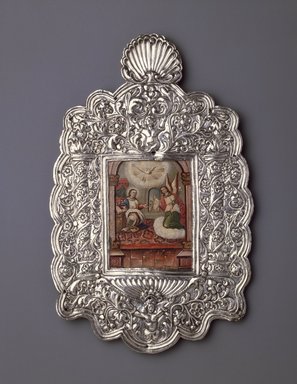Browse

| Accession # | 41.1275.13 |
|---|---|
| Artist | Unknown |
| Title | The Annunciation |
| Date | 18th century |
| Medium | Oil on paper mouinted on copper plate (painting); silver on wood core (frame) |
| Dimensions | 11 7/8 x 7 1/2 in. (30.2 x 19.1 cm) frame: 12 x 7 1/2 x 1/2 in. (30.5 x 19.1 x 1.3 cm) |
| Credit Line | Museum Expedition 1941, Frank L. Babbott Fund |
| Location | Visible Storage: Case 34, Shelf D (Spanish Colonial Art) |
Curatorial Remarks: PAINTINGS AND THEIR FRAMES
Lists of paintings in dowries and estate inventories often include descriptions, however brief, of their frames. In the colonial period, frames were often higher in value than their painted images, especially when made of silver or embellished with gold leaf. Paintings were even cut down to fit expensive frames or discarded altogether and replaced with mirrors.
The nearby large painting on copper of Saint Catherine of Siena was evidently so esteemed by its owner that a richly embossed silver frame was commissioned for it. The valuable silver frames for the two small, unrefined interpretations of the Annunciation and the Meeting of Joachim and Anna—adorned with embossed flowers, twisted Solomonic columns, putti (winged infants), scalloped shells, and mythological creatures—were probably worth more than the paintings.
LAS PINTURAS Y SUS MARCOS
Las listas de pinturas en dotes e inventarios de propiedad a menudo incluyen descripciones, aunque breves, de sus marcos. En el periodo colonial, los marcos solían ser más costosos que las imágenes pintadas que contenían, especialmente cuando estaban hechos de plata o adornados con hoja de oro. Las pinturas incluso se cortaban para hacerlas encajar dentro de marcos costosos o se desechaban del todo y se sustituían por espejos.
La gran pintura sobre cobre cercana que muestra a Santa Catalina de Siena evidentemente era tan estimada por su propietario que comisionó un lujoso marco de plata repujada para contenerla. Los valiosos marcos de plata de las dos pequeñas, y algo ingenuas, interpretaciones de La Anunciación y El Encuentro de Joaquín y Ana—adornadas con flores en relieve, columnas Salomónicas en espiral, putti (querubines o amorcillos), conchas onduladas y criaturas mitológicas—probablemente valían más que las pinturas mismas.